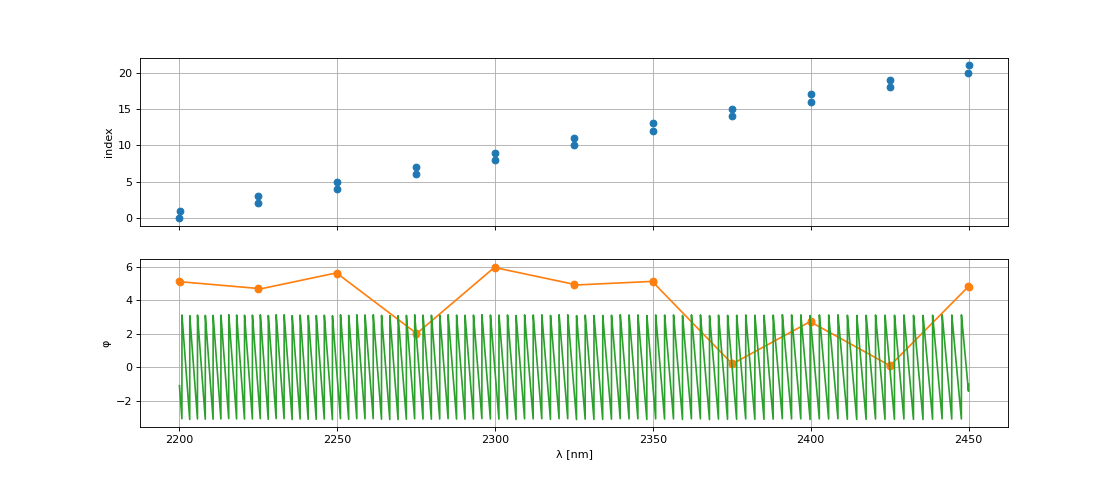sax.utils module#
SAX General Utilities
- block_diag(*arrs)[source]#
create block diagonal matrix with arbitrary batch dimensions
- Parameters:
arrs (ComplexArrayND) –
- Return type:
ComplexArrayND
- clean_string(s, dot='p', minus='m', other='_')[source]#
clean a string such that it is a valid python identifier
- Parameters:
s (str) –
- Return type:
str
- copy_settings(settings)[source]#
copy a parameter dictionary
- Parameters:
settings (Settings) –
- Return type:
Settings
- validate_settings(settings)[source]#
Validate a parameter dictionary
- Parameters:
settings (Settings) –
- Return type:
Settings
- try_complex_float(f)[source]#
try converting an object to float, return unchanged object on fail
- Parameters:
f (Any) –
- Return type:
Any
- flatten_dict(dic, sep=',')[source]#
flatten a nested dictionary
- Parameters:
dic (Dict[str, Any]) –
sep (str) –
- Return type:
Dict[str, Any]
- get_ports(S)[source]#
get port names of a model or an stype
Note
if a Model function is given in stead of an SDict, the function will be traced by JAX to obtain the port combinations of the resulting SType. Although this tracing of the function is ‘cheap’ in comparison to evaluating the model/circuit. It is not for free! Use this function sparingly on your large Model or circuit!
- Parameters:
S (Union[Model, SType]) –
- Return type:
Tuple[str, …]
- get_port_combinations(S)[source]#
get port combinations of a model or an stype
- Parameters:
S (Union[Model, SType]) –
- Return type:
Tuple[Tuple[str, str], …]
- get_settings(model)[source]#
Get the parameters of a SAX model function
- Parameters:
model (Union[Model, ModelFactory]) –
- Return type:
Settings
- grouped_interp(wl, wls, phis)[source]#
Grouped phase interpolation
Note
Grouped interpolation is useful to interpolate phase values where each datapoint is doubled (very close together) to give an indication of the phase variation at that point.
Warning
this interpolation is only accurate in the range [wls[0], wls[-2]) (wls[-2] not included). Any extrapolation outside these bounds can yield unexpected results!
(
Source code,png,hires.png,pdf)
- Parameters:
wl (FloatArrayND) –
wls (FloatArrayND) –
phis (FloatArrayND) –
- Return type:
FloatArrayND
- merge_dicts(*dicts)[source]#
merge (possibly deeply nested) dictionaries
- Parameters:
dicts (Dict) –
- Return type:
Dict
- mode_combinations(modes, cross=False)[source]#
create mode combinations for a collection of given modes
- Parameters:
modes (Iterable[str]) –
cross (bool) –
- Return type:
Tuple[Tuple[str, str], …]
- rename_params(model: ModelFactory, renamings: Dict[str, str]) ModelFactory[source]#
- rename_params(model: Model, renamings: Dict[str, str]) Model
rename the parameters of a Model or ModelFactory given a renamings mapping old parameter names to new.
- rename_ports(S: SDict, renamings: Dict[str, str]) SDict[source]#
- rename_ports(S: SCoo, renamings: Dict[str, str]) SCoo
- rename_ports(S: SDense, renamings: Dict[str, str]) SDense
- rename_ports(S: Model, renamings: Dict[str, str]) Model
- rename_ports(S: ModelFactory, renamings: Dict[str, str]) ModelFactory
rename the ports of an SDict, Model or ModelFactory given a renamings mapping old port names to new.
- update_settings(settings, *compnames, **kwargs)[source]#
update a nested settings dictionary
Note
1. Even though it’s possible to update parameter dictionaries in place, this function is convenient to apply certain parameters (e.g. wavelength ‘wl’ or temperature ‘T’) globally. 2. This operation never updates the given settings dictionary inplace. 3. Any non-float keyword arguments will be silently ignored.
- Parameters:
settings (Settings) –
compnames (str) –
kwargs (Any) –
- Return type:
Settings
- validate_not_mixedmode(S)[source]#
validate that an stype is not ‘mixed mode’ (i.e. invalid)
- Parameters:
S (SType) – the stype to validate
- validate_multimode(S, modes=('te', 'tm'))[source]#
validate that an stype is multimode and that the given modes are present.
- Parameters:
S (SType) –
- Return type:
None
- class Normalization(mean, std)[source]#
Bases:
NamedTuple- Parameters:
mean (ComplexArrayND) –
std (ComplexArrayND) –
- mean: ComplexArrayND#
Alias for field number 0
- std: ComplexArrayND#
Alias for field number 1
- cartesian_product(*arrays)[source]#
calculate the n-dimensional cartesian product of an arbitrary number of arrays
- Parameters:
arrays (ComplexArrayND) –
- Return type:
ComplexArrayND
- normalize(x, normalization)[source]#
normalize an array with a given mean and standard deviation
- Parameters:
x (ComplexArrayND) –
normalization (Normalization) –
- Return type:
Tuple[ComplexArrayND]
- denormalize(x, normalization)[source]#
denormalize an array with a given mean and standard deviation
- Parameters:
x (ComplexArrayND) –
normalization (Normalization) –
- Return type:
ComplexArrayND
